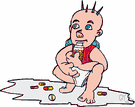trauma
(redirected from traumas)Also found in: Thesaurus, Medical, Encyclopedia.
Related to traumas: traumatic
trau·ma
(trô′mə, trou′-)n. pl. trau·mas or trau·ma·ta (-mə-tə)
1.
a. Serious injury to the body, as from physical violence or an accident: abdominal trauma.
b. Severe emotional or mental distress caused by an experience: He experienced trauma for years after his divorce.
2.
a. An experience that causes severe anxiety or emotional distress, such as rape or combat: memories that persist after a trauma occurs.
b. An event or situation that causes great disruption or suffering: the economic trauma of the recession.
[Greek; see terə- in Indo-European roots.]
trau·mat′ic (-măt′ĭk) adj.
trau·mat′i·cal·ly adv.
American Heritage® Dictionary of the English Language, Fifth Edition. Copyright © 2016 by Houghton Mifflin Harcourt Publishing Company. Published by Houghton Mifflin Harcourt Publishing Company. All rights reserved.
trauma
(ˈtrɔːmə)n, pl -mata (-mətə) or -mas
1. (Psychology) psychol a powerful shock that may have long-lasting effects
2. (Pathology) pathol any bodily injury or wound
[C18: from Greek: a wound]
traumatic adj
trauˈmatically adv
Collins English Dictionary – Complete and Unabridged, 12th Edition 2014 © HarperCollins Publishers 1991, 1994, 1998, 2000, 2003, 2006, 2007, 2009, 2011, 2014
trau•ma
(ˈtraʊ mə, ˈtrɔ-)n., pl. -mas, -ma•ta (-mə tə)
1.
a. a body wound or shock produced by physical injury, as from an accident.
b. the condition produced by this.
2. Psychiatry. psychological shock or severe distress from experiencing a disastrous event outside the range of usual experience, as rape or military combat.
3. any wrenching or distressing experience, esp. one causing a disturbance in normal functioning.
[1685–95; < Greek traûma wound]
trau•mat•ic (trəˈmæt ɪk, trɔ-, traʊ-) adj.
trau•mat′i•cal•ly, adv.
Random House Kernerman Webster's College Dictionary, © 2010 K Dictionaries Ltd. Copyright 2005, 1997, 1991 by Random House, Inc. All rights reserved.
ThesaurusAntonymsRelated WordsSynonymsLegend:
Switch to new thesaurus
| Noun | 1. |  trauma - any physical damage to the body caused by violence or accident or fracture etc. trauma - any physical damage to the body caused by violence or accident or fracture etc.health problem, ill health, unhealthiness - a state in which you are unable to function normally and without pain brain damage - injury to the brain that impairs its functions (especially permanently); can be caused by trauma to the head, infection, hemorrhage, inadequate oxygen, genetic abnormality, etc. birth trauma - physical injury to an infant during the birth process blast trauma - injury caused the explosion of a bomb (especially in enclosed spaces) blunt trauma - injury incurred when the human body hits or is hit by a large outside object (as a car) bump - a lump on the body caused by a blow burn - an injury caused by exposure to heat or chemicals or radiation dislocation - a displacement of a part (especially a bone) from its normal position (as in the shoulder or the vertebral column) electric shock - trauma caused by the passage of electric current through the body (as from contact with high voltage lines or being struck by lightning); usually involves burns and abnormal heart rhythm and unconsciousness fracture, break - breaking of hard tissue such as bone; "it was a nasty fracture"; "the break seems to have been caused by a fall" cryopathy, frostbite - destruction of tissue by freezing and characterized by tingling, blistering and possibly gangrene intravasation - entry of foreign matter into a blood vessel penetrating injury, penetrating trauma - injury incurred when an object (as a knife or bullet or shrapnel) penetrates into the body pinch - an injury resulting from getting some body part squeezed rupture - state of being torn or burst open strain - injury to a muscle (often caused by overuse); results in swelling and pain whiplash, whiplash injury - an injury to the neck (the cervical vertebrae) resulting from rapid acceleration or deceleration (as in an automobile accident) wale, weal, welt, wheal - a raised mark on the skin (as produced by the blow of a whip); characteristic of many allergic reactions lesion - an injury to living tissue (especially an injury involving a cut or break in the skin) |
| 2. |  trauma - an emotional wound or shock often having long-lasting effects trauma - an emotional wound or shock often having long-lasting effectsbirth trauma - emotional injury inflicted on an infant by events incident to birth that is alleged to appear in symbolic form in patients with mental illness mental condition, mental state, psychological condition, psychological state - (psychology) a mental condition in which the qualities of a state are relatively constant even though the state itself may be dynamic; "a manic state" |
Based on WordNet 3.0, Farlex clipart collection. © 2003-2012 Princeton University, Farlex Inc.
trauma
noun
Collins Thesaurus of the English Language – Complete and Unabridged 2nd Edition. 2002 © HarperCollins Publishers 1995, 2002
trauma
noun1. Marked tissue damage, especially when produced by physical injury:
The American Heritage® Roget's Thesaurus. Copyright © 2013, 2014 by Houghton Mifflin Harcourt Publishing Company. Published by Houghton Mifflin Harcourt Publishing Company. All rights reserved.
Translations
traumavamma
psychicznytraumauraz
trauma
[ˈtrɔːmə]B. CPD trauma centre, trauma center (US) N → departamento m (hospitalario) de urgencias
Collins Spanish Dictionary - Complete and Unabridged 8th Edition 2005 © William Collins Sons & Co. Ltd. 1971, 1988 © HarperCollins Publishers 1992, 1993, 1996, 1997, 2000, 2003, 2005
Collins English/French Electronic Resource. © HarperCollins Publishers 2005
trauma
n (Psych) → Trauma nt, → seelischer Schock
Collins German Dictionary – Complete and Unabridged 7th Edition 2005. © William Collins Sons & Co. Ltd. 1980 © HarperCollins Publishers 1991, 1997, 1999, 2004, 2005, 2007
Collins Italian Dictionary 1st Edition © HarperCollins Publishers 1995
trau·ma
1. n. trauma, estado psicológico;
2. traumatismo, si se refiere a una condición física.
English-Spanish Medical Dictionary © Farlex 2012
trauma
n (physical) trauma m, traumatismo; (psych) trauma mEnglish-Spanish/Spanish-English Medical Dictionary Copyright © 2006 by The McGraw-Hill Companies, Inc. All rights reserved.